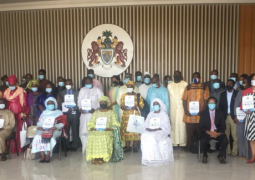
“MJFC urges the National Assembly and the Executive to ensure timely reform of the law on FGM-C to ensure that legislative gaps are addressed,” the foundation said in a statement on Thursday following the conviction of a trio for FGM.
“In particular the present law does not provide for FGM perpetrated by Gambians beyond the territorial waters of The Gambia. This can lead to perpetrators and accomplices choosing to carry out the practice away from The Gambia to other jurisdictions where the practice is either tolerated or not prohibited,” it added.
The civil society argued that it is important, at least for deterrent purposes, to ensure that the law punishes Gambians who decide to practice FGM in another jurisdiction, further rationalising that French citizens who committed acts of FGM in another country could be prosecuted in France under the French penal code.
FGM, a practice that involves the cutting of the female external genitalia and which has been largely criticised by expert authorities in health matters and described as harmful, was banned with immediate effect by former president Yaya Jammeh during a rally in Kanilai, where the then president was already wrapping up a nation-wide tour.
In that November 2015 declaration, Jammeh promised that FGM would now be history in The Gambia, saying the ban was meant to safeguard the women and girls’ rights: “Government, in its quest to improve the lives and livelihood of women and girls, will not condone any obstacle that will retard their progress.”
The then-president said he had found no “concrete facts” that link FGM to religion, after 21 years of his research in the holy Quran. He therefore warned parents as well as chiefs, Alkalos and circumsicers to desist or face consequences.
Fast forward, in less than a month, the presidential declaration was followed by an amendment of the Women’s Act 2010 - Women's (Amendment) Bill 2015 by the National Assembly – on December 2, which finally criminalised the act and laid down penalties.
However, according to international and national bodies and rights organisations and activists, the practice – which was practised in more than 1000 communities in the country - is still widely practiced across the country, although typically under secretive circumstances.
Until 2018, three years after the legal bar, two arrests were made and only one was brought, with zero conviction or sanction. However, the recent conviction of three women; circumciser and mothers of two children subjected to the practice is the first since the coming of the prohibition law.
Read Other Articles In National News




